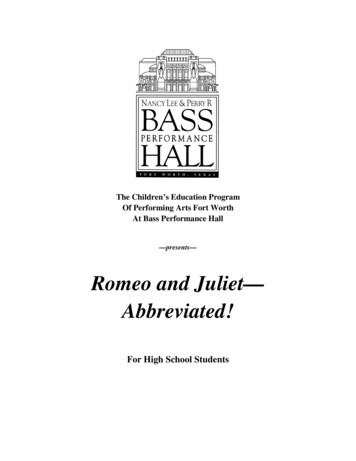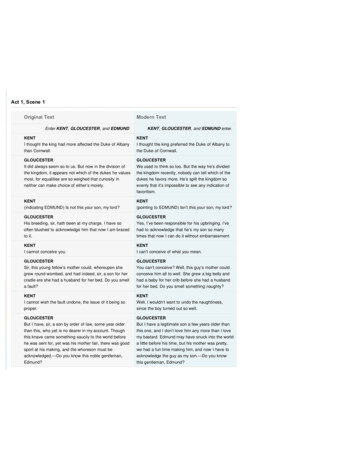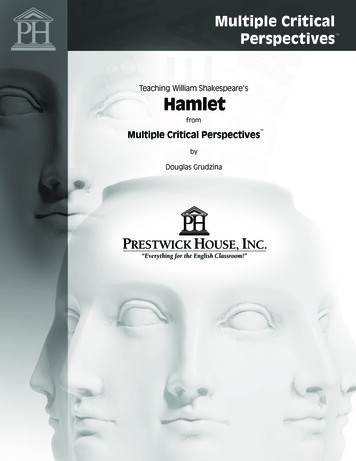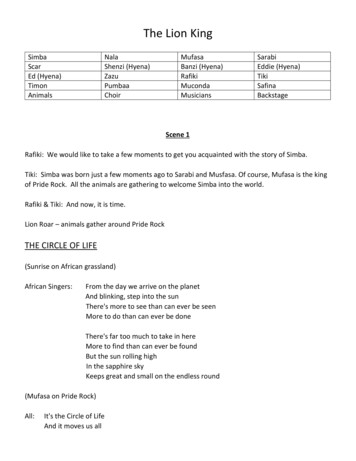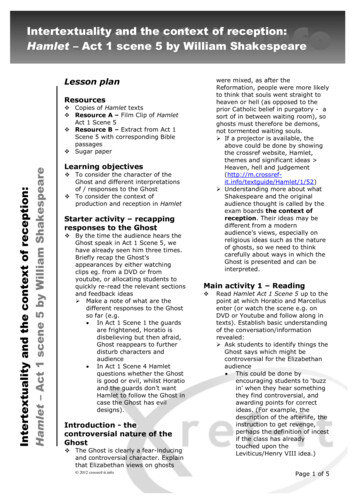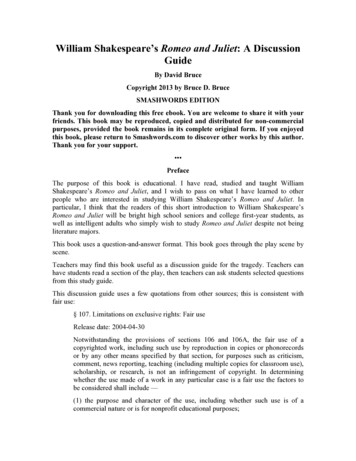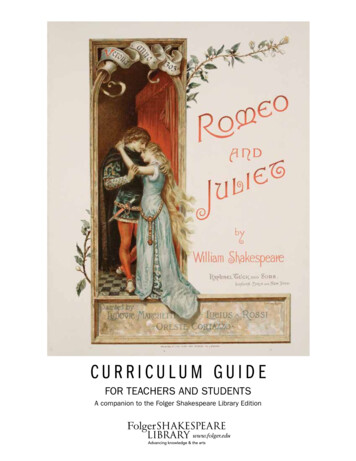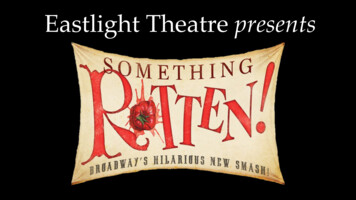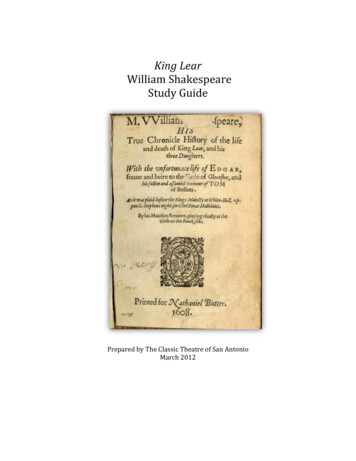
Transcription
King LearWilliam ShakespeareStudy GuidePrepared by The Classic Theatre of San AntonioMarch 2012
Statement from the Director, Tony Ciaravino“How sharper than a serpent’s tooth it is to havea thankless child”- King Lear, Act I sc. 4When a child is born, existence takes onan urgency seldom felt anywhere else. Fromthat moment, we live for them. They carry thelegacy of our choices into their futures for goodand for bad. We nurture them in the hopes thatthey will one day thrive and perhaps care for usas we age. Adults are too often left to fend forthemselves in their old age, abused by ourcollective fear of death. Our children should bethat compassionate, loving face we look to forcomfort and to ease our fears. When they arenot, it is catastrophic.Our production of King Lear focuses onthe personal aspects of the parallel story lines.Both Lear and Gloucester misread theirchildren. In Gloucester’s case he is so blinded by rage at the thought of his belovedEdgar’s betrayal that he doesn’t even recognize him when disguised as the mad“Poor Tom”. It is only after his literal blinding that he is able to see the truth.King Lear is driven out into the cold and descends into madness due to the“monster ingratitude” of his eldest daughters. The question to consider is how muchof this ingratitude is Lear reaping what he has sown. He starts the play as the headof a great empire. His tyranny is on full display when he banishes both Kent and hisbeloved Cordelia for their perceived assault on his authority. Lear’s rightful place isto be King and cherished by his daughters. When Cordelia can’t satisfy Lear’s needfor praise; the storm of madness begins. The storm reaches its apex when his eldestdaughters abandon him. It is only after Lear loses everything that he is able to learnthat love between parent and child is not expressed by heaping praise but byultimate sacrifice. The story while tragic is ultimately a story of redemption and thetriumph of love over greed and pride. Lear reconnects with his beloved Cordelia anddies with her cradled in his arms, as he must have held her so many times in herchildhood.Prepared by The Classic Theatre of San Antonio, March 20122
Sound DesignRick Malone, DesignerRegardless of the period of the play and theplaywright, the sound design should support thetext and the director’s concept. That said, if thedirector sets the play in the American 1930’s, thesound design should be consistent with that timeperiod, both in effects and music. In general,Shakespeare’s plays give the sound designer a greatlatitude except when the effect is specificallyreferenced in the text. I recall designing the“Scottish Play” and it was set in a non-specific timeand the sky was the limit with the sound.In Lear, we want to highlight the stress and miserythat Lear experiences and some of that will be donewith sound. Sound will be used to highlightcharacter and to advance the plot.Set DesignMary Evans, DesignerThe theatrical set is a selective, chosen world imagined by a designer and crafted bya builder in which action and reaction take place, small and large ideas andemotions are fleshed out and viewers are transported to a different location, timeand social code for the duration of the play. When designing for a demanding playlike "Lear," which shifts from one place to another very quickly over and over, theset must be a chameleon; it must be able to shape-shift as the play progressesPrepared by The Classic Theatre of San Antonio, March 20123
through light changes and set/actor interaction. It needs to be simple andnonspecific, but still offer the director a wealth of acting areas and choices forblocking movement in order to successfully illustrate relationships betweencharacters and between characters and their environment. The relationshipbetween Lear and his surroundings change from one of reckless domination of thenatural world, to one of fear and madness and, eventually, heartbreaking grief andcompassion. He begins by embodying the set in its grandeur: a cold, monolithic,indifferent, self-made kingdom of marble. But the last scene finds Lear's tragicprotagonist's journey has delivered him to a more level, grounded, human scale: thisloving, repentant father mourned, returned to the earth.Costume DesignJodi KarjalaWe have chosen to set this production of King Lear in 1930s America, a time of notonly the Great Depression, but also a time of great wealth and ostentatious displayby America's dynastic families such as the Astors and the Rockefellers, and a timefilled with the greed and corruption of organized crime. The costumes for thisproduction recall the glamor and sophistication of 1930s High Society, withcharacters bedecked in the opulent trapping of wealth: bias cut dresses and finelytailored suits layered with furs and chesterfields, fedoras and homburgs. As with allelse Lear prizes, these trappings are shed along the way, leaving in the end ahumbled Lear clad in the simplest of garments.Interview with a KINGLaurence Olivier, On Acting(Discussing playing the part of King Lear)“When you have the strength for it, you’re too young; once you’ve the age, you’re tooold. It’s the bugger, isn’t it?”Allan S. Ross starring asKing Lear in the ClassicTheatre of San Antonio’sproduction of King Lear.Prepared by The Classic Theatre of San Antonio, March 20124
1) Do you remember the first time you really connected with Shakespeare?I think that the first time I really connected with Shakespeare was thefirst time I actually studied a play in great detail. I was amazed andfascinated by the characters and their relationships. I think like manyyoung people I was put off by the language and the thought thatShakespeare was difficult to understand and therefore boring. Once Ireally took the time to study the play I realized that the people of theplay and their relationships were not that different or difficult tounderstand. They were just more deeply and interestingly drawn.2) Do you have a favorite Shakespeare play?Hamlet is my favorite play. This may be the fact that it is the play withwhich I have been most involved. I have designed it, played Claudiustwice, played Polonius and the gravedigger, designed the ghostsequences and played King Hamlet. It also was the play that got mestarted as a designer.3) Is this the first time you have taken on the role of King Lear?King Lear is a once in a lifetime project that shouldn’t be attempteduntil one feels they are ready to handle it. It is one of the most difficultof all the Shakespeare characters. Lear is problematic for manyreasons. The actor playing Lear must have the maturity to understandthe complexity of the character. He must have the physical strengthand endurance to perform the play. Finally, the sheer size of the rolethat must be memorized is a challenge for any actor of any age. Learhas more than twice as many lines as any other character in the play.4) Did you ever imagine getting to play this role?I think that all serious actors envision themselves being able to playLear. For many actors, it is the last play they choose do. Many actorsfeel, because of its magnitude, that it should be their finalperformance. I hope that will not be my case. I look forward toperforming for many years to come.5) How many times have you done this play?I played Cornwall once in Graduate School at LSU.Prepared by The Classic Theatre of San Antonio, March 20125
6) What do you think sets this play apart from other Shakespeare plays?There are a couple of things that set Lear apart from other plays byShakespeare. One is that it is a double plotted play. There are twostory lines that could be independently played. Shakespeare hasuniquely intertwined the two stories thus adding complexity andinterest. This double plot also amplifies the theme of the, “ingratitudeof children” by showing the relationships between fathers and sons aswell as fathers and daughters. In addition to the structure, the focuson an aging monarch is unique. Usually Shakespeare’s plays deal withkings that are young men in conflict, struggling for power and not aking at the end of his life.7) Can you describe your process in preparing to do a Shakespeare role and howthat differs from contemporary roles?I feel that Shakespeare is one of the best “contemporary” writers ofour day. I mean this in the sense that his characters and plot lines areas applicable today as they were when Shakespeare was alive. Themagnitude of the issues expressed may be greater in his plays but therelationships and conflicts are the same. Other than dealing with thedifference in sentence structure and Shakespeare’s expandedvocabulary, the process in preparing the role is the same. I thinkactors sometimes fall into the trap of thinking that you must approachShakespeare with fear and trembling and find some foreignmethodology to deal with the characters. If we can get over ourintimidation and see the characters as people with the feelings andfears we all share, we will be better able to bring those characters tolife in a meaningful way.8) Has your interpretation of this play changed as you have prepared to play KingLear?My interpretation has changed and will continue to change as we gothrough the rehearsal process. It will bring a greater understanding asother actors and the director share their opinions and insights.In the first reading of King Lear many people see Lear as a selfish anduncaring old man who gets what he deserves. The greater ourunderstanding of Lear’s struggle with madness and disillusionmentthe more easily we are able to feel compassion. We see a king ofalmost infinite power lose everything, but through that loss he find hishumanity. The more we study the play the more we find the loyaltyand love in it, which heightens the emotional impact of the tragedy.Prepared by The Classic Theatre of San Antonio, March 20126
9) What makes your approach to Lear unique? Do you see anything in thischaracter that you feel other actors may have misinterpreted?I don’t know that I can say that another actor has misinterpreted Lear.There are as many interpretations as there are actors to play him. Weall will bring our own unique interpretations in that we are all uniqueindividuals. I have daughters and I have experienced the effects of agerelated dementia on the patient and those who loved them. Both thesefactors will give me a background that some other actors may notpossess.10) Why do think it’s important for students to learn and understand Shakespeare?Shakespeare is a writer that deals with characters and situations thatcan be related to by everyone today. His themes are universal, hisimagery and expression challenge and excite the imagination and hischaracters are both unique and recognizable at the same time. Thedepth, complexity and beauty of his plays are unsurpassed.King Lear in RehearsalCast Includes:Allan S. Ross as King LearBelinda Harolds as GonerilGypsy Pantoja as ReganKathryn Connor as CordeliaDan Yount as GloucesterBrad Adams as EdmundRusty Thurman as EdgarGreg Hinojosa as the FoolMatthew Byron Cassi asKentPrepared by The Classic Theatre of San Antonio, March 20127
Prepared by The Classic Theatre of San Antonio, March 20128
Who’s Who in King LearKing Lear: King of Britain, childlike, passionate, cruel, sympathetic, a very complexcharacter and considered by many to be the most difficult of all the Shakespeareroles. Lear expresses violent impetuosity and eventually goes mad during the courseof the play.Goneril: The eldest daughter of Lear, Fierce, calculating, spoiled and selfish, cooland sarcastic, obsessed with power and wealth, she betrays her father, leaving himin the elements during a storm and then conspiring to kill him during the action ofthe play. She is married to the Duke of Albany, but she is in love with Edmund.Regan: The second daughter of Lear, She is almost indistinguishable from hersister, Goneril. The major difference is that Regan is anxious and shows aparticularly devastating ability to inflict violence when she kills a servant and assistsher husband in gouging out one of Gloucester’s eyes. She is married to the Duke ofCornwall, but is in love with Edmund.Cordelia: The youngest daughter of Lear, She is so honest and genuine that she iswilling to lose everything in order to avoid the spectacle that Lear proposes for thedivision of his kingdom and refuses to play the game of flattery. She is banished andaccepts her fate. She leaves her home to marry the King of France. She later returnsin an attempt to save her father but is unsuccessful. Cordelia is the classic martyrcharacter, although she never complains about the treatment she is forced to bear.Duke of Albany: Husband of Goneril, sides with Lear and is angry at the wayGoneril and Regan have treated him. Goneril complains that he is weak but heportrays a calm confidence and is not easily manipulated. He has strength in hisconvictions. He is one of only two characters that remain to rule the British kingdomat the conclusion of the play.Duke of Cornwall: Husband of Regan, manipulative, ill intentioned, and malicious.He shows no pity for Lear and actively shares his wife’s desire for power and controlover the kingdom. He is the mastermind behind the gouging of Gloucester’s eyes,which he considers safer than killing him without a trial. He is killed by a servant.King of France: Marries Cordelia, he perceives Cordelia to be honest and good. Heis never seen onstage after the first scene.King of Burgundy: A suitor of Cordelia, who decides not to marry her after Leardisinherits and banishes her.Earl of Gloucester: Father of Edgar and Edmund, He is a longtime trusted friendof King Lear. He is blinded by Regan and Cornwall but spends much of the play“blinded” by his inability to see what is true about his sons, Edgar’s loyalty andEdmund’s betrayal. He dies at the end of the play, having seen the error of his ways.Edgar: Oldest son of Gloucester, Loyal to his father throughout, in spite of the factthat his father believes he has betrayed him. He is gullible enough to be manipulatedby his half brother, Edmund. He spends most of the play disguised as Poor Tom, apeasant, or an ordinary gentleman.Edmund: Younger, bastard son of Gloucester, Edmund is unhappy because hewas born out of wedlock and is treated poorly compared to his legitimate brotherPrepared by The Classic Theatre of San Antonio, March 20129
Edgar. From the first moment Edmund addresses the audience, his desire tomanipulate and control is made clear. Throughout the play, he continues to lie andbehave in a selfish manner. In the last few moments before his death, he seems tohave a change of heart when he admits what he done and gives information aboutCordelia’s hanging.Earl of Kent: A loyal advisor to Lear, Kent questions Lear’s decision to banishCordelia which enrages Lear so much that he banishes Kent as well. Instead ofleaving, he disguises himself in order to continue serving Lear. Regan and Gonerilthrow him in the stocks. Once he is released he stands by Lear until his death. Whenoffered a position ruling the British kingdom, he declines because he feels his owndeath is coming too.Fool: Attendant to Lear. The court jester to King Lear. He uses wordplay and jokesto challenge and to entertain the king. Even after Lear has begun to descend intomadness, he remains loyal to him. In spite of his whimsical language, the fool isoften the only one who really speaks “the truth”.Oswald: Goneril’s steward, he is slapped by Lear and vows to seek vengeance. Heassists Goneril and Regan in the destruction of Lear. He carries letters betweenGoneril, Regan and Edmund as they plot to take over the kingdom. He agrees to killGloucester to keep him silent but is killed by Edgar as he attempts to follow theorders.Old Man: Gloucester’s tenant(Smaller characters, often double cast include: A Herald, A Captain, an Officer,a Doctor, Knights, Gentleman, Attendants, Servants and Messengers.Play SynopsisAct 1Lear, the King of Britain, decides to divide his kingdom between his three daughters,Goneril, Regan, and Cordelia. Before dividing the estate, he asks each of hisdaughters to tell him how much they love him. The two older daughters, Goneril andRegan, issue statements of insincere flattery. Cordelia refuses to make such astatement. Because she is unwilling to publicly announce her love for her father,Lear disinherits her. Lear’s advisor Kent, questions his decision to disinheritCordelia, reminding Lear of her true devotion to him. Lear reacts angrily to Kent andbanishes him.The King of France and the Duke of Burgundy are awaiting the division of thekingdom and the news of who will be given Cordelia’s hand in marriage. When Learinforms both suitors of what has transpired, Burgundy immediately withdrawals hisproposal. While the King of France admires Cordelia's honesty and agrees to marryher. Goneril and Regan discuss their father’s apparent old age and strange behaviorand resolve to do “something about it”.Prepared by The Classic Theatre of San Antonio, March 201210
Edmund, the bastard son of the Earl of Gloucester, plots to trick his father intobelieving the letter he carries is proof that his legitimate son, Edgar, plans to killGloucester. The trap is set, and Edmund hopes that he will become the heir to hisfather’s power and wealth.No longer ruling the kingdom, Lear and his knights spend time at the kingdom of hisdaughter Goneril. Goneril is frustrated with their “riotous” behavior and encouragesher servants to ignore Lear and his knights, in hopes that they will leave. She wantsnothing to do with Lear now that she has her inheritance.The nobleman Kent arrives disguised as a peasant, calling himself Caius. Heconvinces Lear to allow him to join the group as a servant. Lear and his knightsbegin to notice that Goneril’s servants are no longer responding to their requests.Lear speaks to Oswald about it and a fight arises. Lear strikes Oswald, with Kentprotecting him. Lear’s Fool arrives and tells him that he has made a terrible mistakein giving away his power to his daughters.Goneril demands that Lear leave or dispatch half of his knights. Lear is shocked andoffended and leaves immediately for Regan’s kingdom. Goneril’s husband, Albany, isdismayed by his wife’s behavior. She tells him that she has written to her sister andthat they are in agreement.Act 2Gloucester’s servant Curan discusses with Edmund the impending arrival of theDuke of Cornwall and his wife, Regan, and the rumors of a disagreement betweenAlbany and Cornwall. Edmund is excited about the Duke of Cornwall’s arrivalbecause he believes Cornwall will assist him with his plan to get rid of Edgar.Edmund calls Edgar from his hiding place and tells him that he must run awayquickly. Edmund hears Gloucester in the distance and fakes a battle between he andEdgar. After Edgar runs away, Edmund cuts himself to make his story of Edgar’sbetrayal more convincing. He tells Gloucester that Edgar attacked him when herefused to join the plot to kill their father. Devastated, Gloucester is convinced hisson has turned against him.Kent, still disguised, approaches Gloucester’s castle, at the same time that Oswald,the chief steward of Goneril’s household arrives. Oswald does not recognize Kentfrom their previous battle (Act 1, Scene 4). They begin to argue, and Edmund,Cornwall, Regan, Gloucester arrive to find out what the commotion is about. Kent isthrown into the stocks. Imprisoned, he reads the letter he has received fromCordelia promising to do everything possible to improve Lear’s situation in Britain.Lear arrives to find his messenger locked up. Lear argues with Regan about the wayhe is being treated. She does not sympathize with him and encourages him toapologize to Goneril and beg for her forgiveness. Goneril arrives and the sistersfinally declare that their father can only stay with them if his knights leave. Movingfrom shock and grief to fury, Lear leaves the house and goes outside into a brewingPrepared by The Classic Theatre of San Antonio, March 201211
storm, on the brink of madness. Gloucester begs Goneril and Regan to bring Learback inside, fearing for his safety in the storm, but they refuse and bolt the castledoors.Act 3Finally free, Kent leaves to search for Lear. He sends a messenger to Cordelia askingfor her help. In the meantime, Lear remains in the middle of the storm, ranting inanger and confusion. His fool attempts to convince him to ask his daughters forforgiveness in order to take shelter from the storm but Lear refuses. Kent finds themand insists they take cover in a nearby shack.Inside the castle, Gloucester warns Edmund that a battle is going to take placebetween Britain and France and that Lear’s daughters must not be permitted tobehave this way toward their father. He tells him about a letter he has hidden in hisroom that gives details about this impending attack. He leaves to find Lear.Realizing the letter implicates his father, Edmund now has everything he needs todestroy his father and inherit his wealth.Upon reaching the shelter, Lear refuses to enter saying he doesn’t feel the storm andsends the fool inside while he kneels to pray. Lear is overwhelmed with remorseover how little he cared for the poor and homeless when he was king. The fool runsfrom the shelter, declaring it to be occupied by a spirit. The “spirit” is Edgar, nakedand covered in mud, pretending to be the madman Tom O’Bedlam who is beingchased by a devil. Noticing his nakedness, Lear removes his own clothes as well.Gloucester arrives and attempts to bring Lear back to the castle but he refuses.In the castle, Edmund shows Cornwall the letter revealing that Gloucester hasconspired in the impending French attack. Cornwall bestows upon Edmund the titleof the Earl of Gloucester and is sent into the storm to search for Gloucester andbring him back for questioning.Kent, Lear, Edgar, and the fool enter the shack for shelter from the storm whileGloucester leaves to find provisions. Lear holds a mock trial for Regan and Goneril,convicting them both of betrayal. Gloucester returns announcing that a plan to killthe King is underway and that he must leave immediately for Dover where theFrench army waits. They leave and Gloucester returns to the castle.Cornwall, Goneril and Regan conspire to punish Gloucester for his betrayal.Gloucester is captured and brought to Regan and Cornwall. They taunt him, andRegan plucks at his beard. Gloucester declares that he will not rest until he seesLear’s mistreatment avenged. In response, Cornwall tells Gloucester that he will seenothing and proceeds to gouge out one of Gloucester’s eyes. A servant attempts tointervene and a sword fight erupts. Cornwall is wounded. Regan attacks the servantwith a sword and kills him. Even wounded, Cornwall proceeds to gouge outGloucester’s remaining eye. Gloucester yells for Edmund to help him and is shockedto learn it was Edmund who betrayed him. Gloucester understands the mistake hePrepared by The Classic Theatre of San Antonio, March 201212
has made in believing Edmund and abandoning Edgar. Cornwall and Regan leave toget medical help for Cornwall’s wounds. The servants discuss the terrible thingsthey have just witnessed and decide to help Gloucester by bandaging his eyes andfinding the mad beggar Tom to help Gloucester escape to safety.Act 4Edgar, still disguised as mad Tom, agrees to lead Gloucester to Dover.Oswald, Goneril and Edmund arrive at Goneril’s palace to learn that Albany is angryover how they have treated Lear. Goneril declares Albany a coward and instructsEdmund to return to Cornwall’s palace to gather his troops for the impending fight.She presents him with a necklace and a kiss, promising him more when they meetagain. They learn that Cornwall has been killed during the punishment ofGloucester.Kent (who is still in disguise) arrives at the French camp in Dover . He learns thatCordelia is very devastated by what has become of her family. She sends onehundred knights to search for her father. The troops prepare for the battle withBritain.Back at the palace, Regan begs Oswald to allow her to read the letter he carries fromGoneril to Edmund. He refuses to break the seal. Regan warns Oswald that whileGoneril may not love her husband, a relationship with Edmund is still adultery and adangerous game for him to be involved in. As a widow, Regan is now free to developa relationship with Edmund. She gives Oswald a token to give to Edmund and askshim to find and kill Gloucester in return for unspecified rewards. He agrees andleaves.The disguised Edgar pretends to lead Gloucester to the highest cliff in Dover, whichis actually a small hill. Gloucester kneels to pray for forgiveness and jumps, falling tothe ground. Edgar wakes him and convinces him that he has miraculously survivedhis suicide attempts from the “cliffs” and that the Gods must not want to him to die.They come across Lear as they continue the journey to Dover. Lear has gonecompletely mad, and wears a crown of flowers on his head. Lear recognizesGloucester and declares that adultery was Gloucester’s undoing. Lear proceeds torant against womanhood in general, drifting into indecipherable babble.Oswald arrives with the intention of killing Gloucester and collecting on Regan’spromise. Edgar mortally wounds Oswald. Oswald begs Edgar to take the letters hecarries before he dies. Edgar reads the letter intended for Edmund and learns thatGoneril wants Edmund to kill Albany.In the French camp, Cordelia promises to keep Kent’s true identity to herself. Learhas been cleaned up and is sleeping peacefully. When he awakes, he seems unsureabout whether he recognizes Cordelia. Lear admits that he has gone senile and thatPrepared by The Classic Theatre of San Antonio, March 201213
his daughter Cordelia must despise him and want him dead the way her sisters do.Cordelia tells him that all is forgiven and they embrace.Act 5Regan demands to know whether Edmund is in love with Goneril or has been to bedwith her. He denies both accusations and promises that he will not betray her.Goneril and Albany arrive, sharing the news that Lear has reached Cordelia’s campand joined the French army. Goneril and Regan are both unwilling to leave the otheralone with Edmund; so they leave together.Edgar (disguised as a peasant) gives Albany the letter he received from Oswald.Edgar warns him that the letter must be read before he goes into battle. Albanywants Edgar to stay while he reads the letter but he refuses, declaring the he wasforbidden to do so. As the knights prepare for the battle, Edmund laments over hisindecision on whether to marry Goneril or Regan. He swears that if Cordelia andLear are captured, he will show them no mercy.Edgar leaves Gloucester to fight in the battle. He returns quickly saying that theFrench have lost and that Lear and Cordelia have been captured.Edmund is in charge of the prisoners, Lear and Cordelia. Lear begs to be placed inprison with his dear Cordelia, living like caged birds for the rest of their lives.Cordelia and Lear embrace and are then led away by soldiers. Edmund hands thecaptain of the army a note with instructions for what to do with the prisoners. Healludes to the contents of the note by asking the captain if he understands that being“tender-minded does not become a sword”. The captain agrees to follow Edmund’sorders.Albany arrives with Goneril and Regan. He compliments Edmund on the well-foughtbattle and asks that Lear and Cordelia be brought to him. Edmund tells him that theKing and Cordelia were sent away in order to avoid a mutiny should the soldierssympathize with them. Albany rebukes Edmund and says that these actions wereout of line for his position. Regan interrupts and declares that Edmund will be herhusband soon and therefore he has the right to make such decisions. Goneril andRegan begin to argue but Regan must leave when she begins to feel ill. Albanyproduces the letter he received and arrests Edmund for treason. Albany sounds thetrumpet, signaling Edgar to appear. Edgar wounds Edmund in a sword fight butdoes not kill him so that he can be questioned. Goneril tries to intervene on behalf ofEdmund but Albany produces the letter, proving her plans to have him killed.Goneril leaves humiliated.Edgar reveals his identity to Albany and tells the story of how he led his father toDover. He announces that Gloucester died suddenly when he realized Edgar hadbeen with him all along and that he had been forgiven.Prepared by The Classic Theatre of San Antonio, March 201214
A gentleman bursts in, holding a knife covered in blood and announces that Gonerilhas committed suicide and that Regan has died from poisoning. The bodies of Reganand Goneril are brought and laid out for everyone to see. Kent demands to know thewhereabouts of Lear and Cordelia. Edmund, near death from his wounds, admitsthat he ordered Cordelia’s death by hanging. A messenger is sent to attempt to stopthe hanging.Lear enters carrying the dead body of Cordelia in his arms. The messenger did notarrive in time to save her. Lear weeps over her body. Overcome with grief andmadness, Lear dies.Albany returns the titles that were stripped from Edgar and Kent. He also invitesthem to rule the kingdom alongside him. Kent feels that he is too old for thechallenge but Edgar accepts. The mood is somber as Kent, Edgar and Albany exit,leaving behind the dead bodies of Goneril, Regan, Edmund and Lear.Quotable King LearAct 1, Scene 1Cordelia: “What shall Cordelia speak? Love, and be silent.”Act 1, Scene 2Edmund: “A credulous father and a brother noble, Whose nature is so far fromdoing harms that he suspects none – on whose foolish honesty my practicesride easy. “Act 1, Scene 3Goneril: “I’ll not endure it. His knights grow riotous and himself upbraids uson every trifle.”Act 1, Scene 4Lear: “ How sharper than a serpent’s tooth it is to have a thankless child.”Act 1, Scene 5Fool: “Yes, indee
Study Guide Prepared by The Classic Theatre of San Antonio March 2012 . Prepared by The Classic Theatre of San Antonio, March 2012 2 Statement from the Director, Tony Ciaravino "How sharper than a serpent's tooth it is to have a thankless child" - King Lear, Act I sc. 4
